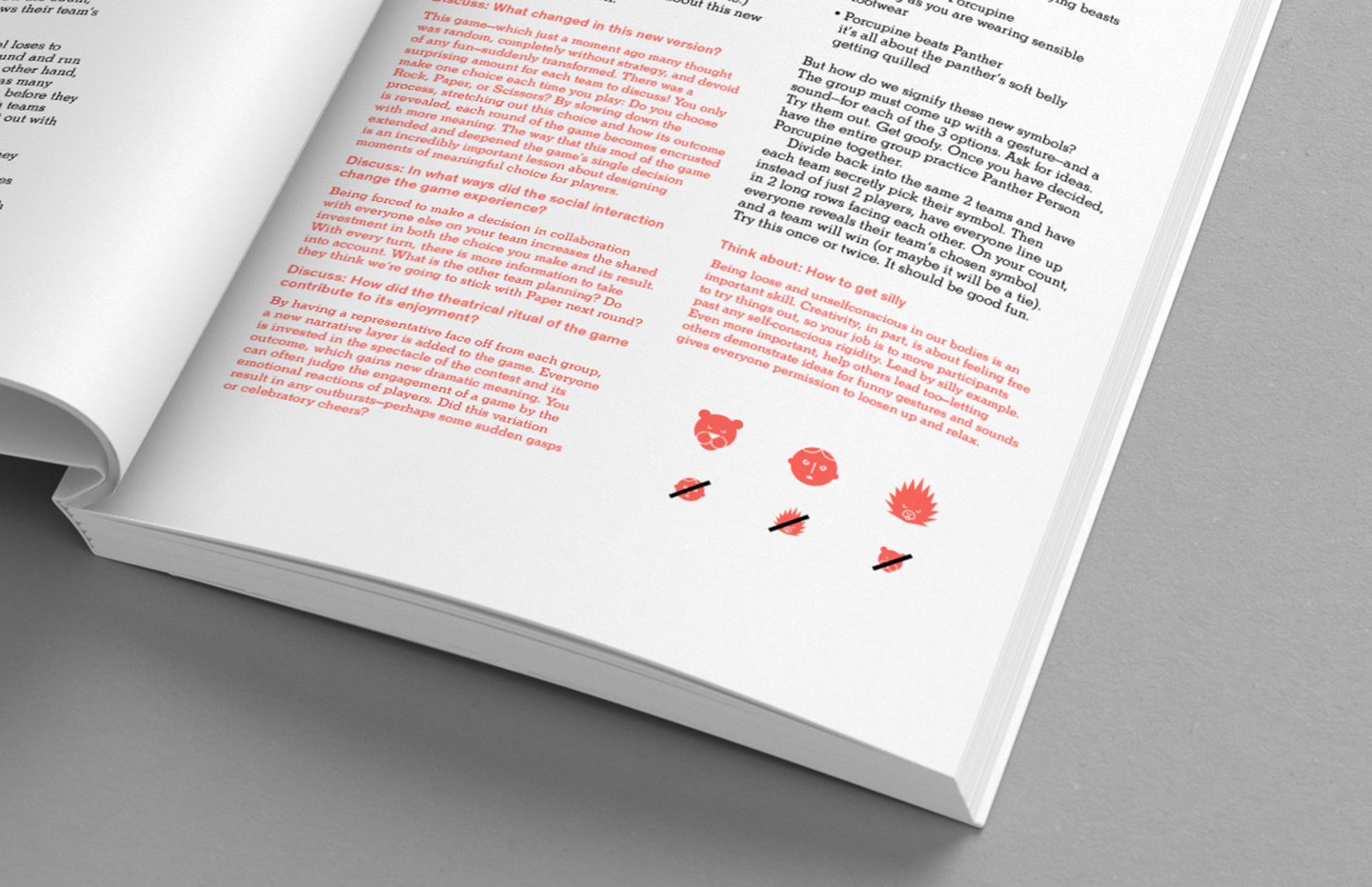Play, Systems and Design are organizing concepts of the book. They challenge us to be playful, to think rigorously, and to be intentional about the process of making.
Everyone is a designer
If you create experiences, manage organizations, collaborate with people, or in any way take part in the production of culture, you are designing. In my experience, design is about doing and living and being. It is less about knowledge and data and more about experimentation and practice. This book is a design manual filled with things to do.
I call these things to do “exercises.” Just like physical exercises, they are ways of using your body and mind, to train them and make them stronger and more flexible. Each exercise challenges you to interact with other people, solve problems, and think about how things are put together. Some of them are full-body physical games. Others take place on a tabletop. Most of the exercises require limited materials and setup. And all of them can be done without computers. You can try out the exercises with just a handful of people, but many of them can work for dozens or even hundreds at once. They are not only designed for educational situations, like classrooms and workshops, but also for a lunch break at work or just playing around with friends.
The exercises in this book come out of my experiences as a game player and designer, and from more than three decades of teaching design. They have been played by artists, educators, students, technologists, businesspeople, researchers, and designers of all kinds—from kids in after-school programs to creative leads at the biggest game companies in the world. They are valuable for anyone who wants to know more about how people think, how systems work, how to create meaningful experiences, and how to redesign the world for the better.
sample exercises
What you learn
A grounded sense of self
Playing is a way to feel loose and free in our bodies and minds. As we play, we come to know who we are and learn to experiment with new ways of being.
Analyzing how systems work
Understanding, modifying, and designing the intricate structures of games is a remarkably effective way of practicing systems thinking.
Understanding people
We design for other people, observing them throughout the design process. Play is a place to deepen our awareness of human psychology and emotions.



Communicating ideas
Games are artificial languages of meaning. Playing and designing them are occasions to practice the essential design skill of communication.
Flexible thinking
In game design, you sometimes think like a mathematician and at other times like a storyteller, or a party host, or an anthropologist. Playing stretches your mind in new ways.
Creative problem solving
As unpredictable complex systems, games force us to try out ideas, see what is and isn't working, and proceed through creative experimentation.

Productive collaboration
Whether you are playing with others, engaging with playtesters, or working with fellow designers, play requires constant collaborative activity.
Designing human experiences
Play and games engage every part of us, from our physical senses to our social and cultural selves. Designing for others is training in understanding people.
A rigorous process of making
The iterative game design process—the cycle of prototyping, playtesting, and analyzing—is a useful model for designing anything.
Critically connecting to culture
The meaning of play emerges from how we interact with the world. Games can be a place to play with the complex web of culture.
sample essays
Living in a ludic century
We are living at a time when so many aspects of our lives—the ways that we work and learn, how we communicate and socialize and romance, the ways that we engage with government and connect with our communities—are mediated by complex networks of information. Our lives are ruled by financial databases and social networks and vast bureaucracies of information that we will never see.
As part of this trend line, media, art, and entertainment are becoming increasingly modular, interactive, and customizable. The moving image has shifted from darkened cinemas and flickering television screens to the internet, to be endlessly streamedand sliced and shared. Information no longer comes from a set of encyclopedias on a shelf but instead from the participatory, evolving, contentious processes of Wikipedia. The rise of digital games as an economic and cultural powerhouse is both a cause and an effect of this shift. In fact, the twenty-first century might be termed a Ludic Century, an epoch in which games and play are the model for how we interact with culture and with each other.
"[...] games are an important way of understanding these changes occurring across society and technology and design—because games have always been modular, interactive, customizable systems."
This doesn't mean that in the future everything will be a game. It does mean that games are an important way of understanding these changes occurring across society and technology and design—because games have always been modular, interactive, customizable systems. Every game ever played, from five-thousand-year-old board games to last year’s video game blockbusters, are situations in which people push and pull at inputs and outputs, exploring and inhabiting and manipulating. The ancient cultural form of games turns out to be a kind of miniature laboratory for practicing these emerging forms of twenty-first-century literacy.
And we need them more than ever. The problems of the Ludic Century are complex system problems. Environmental collapse, social inequity, the design of democracy itself—these seemingly intractable challenges are tied to our increasingly integrated and complicated world. I believe games can help. Not that playing itself solves these problems, but the kinds of thinking that come out of games and play are exactly the kinds of thinking that can begin to address these wicked challenges.



